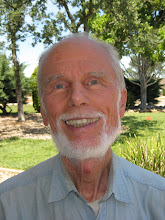Tolkein's fantasy world in The Lord of the Rings lacks direct references to God and contasts sharply with C. S. Lewis's Narnia by Middle Earth's lack of a personal figure representing God as Aslan does in Narnia. But Tolkein's overarching mythology of Middle Earth set forth in The Silmarillion names the Creator of Middle Earth and its creatures Eru, the One, who in Arda, the earth, is called Iluvatar. This story further parallels the Biblical account of creation in Genesis with the rebellion and fall of Melkor, the greatest of the angelic spirits called the Valar, a story obviously modeled on the rebellion of Lucifer against God. And both Gandalf the Grey (not really a wizard, but a Valar) and elven King Elrond, two of the wisest and most powerful beings working for good in Middle Earth during its Third Age, tell us that a higher power is secretly working to thwart the Dark Lord Sauron of Mordor.
Moreover, other good characters recognize a transcendent ethic that contrasts sharply with the relativism of good and evil of contemporary imaginative works such as the Star Wars science fiction movies and Joanne Rowling's fantasy world of Harry Potter and the Hogwarts School of Witchcraft and Wizardry. Consider, for example, Gene Edward Veith's citation from The Two Towers (the second volume of Tolkein's trilogy) in "Still Ringing True," World Magazine, 2001:
"Good and ill have not changed since yesteryear; nor are they one thing among Elves and Dwarves and another among Men. It is a man's part to discern them, as much in the GoldenWood as in his own house."
Have you readers of Tolkein's trilogy noted other examples of this absolute morality that transcends time and place and is common to elves, men and the other rational creatures of Middle Earth? Or of other evidences of Providence in Middle Earth besides Gandalf's reassurance of Frodo that a power other than that of Sauron had brought the One Ring to Frodo and besides King Elrond's affirmation that the apparently chance gathering of representatives of the races of Middle Earth at his palace was not an accident but was ordained? If so, please post them.
Monday, December 3, 2007
Transcendence in J. R. R. Tolkein's "Lord of the Rings"
Labels:
C.S. Lewis,
Hogwarts,
J.K. Rowling,
J.R.R. Tolkein,
Middle Earth,
Narnia
Subscribe to:
Post Comments (Atom)

4 comments:
What you say about transcendence is true in LOTR. The real contrast is with The Golden Compass, where it is entirely lacking. LOTR, like the book of Esther, never mentions the word "God," yet His presence is on every page, in the forms especially of providence and virtue. There is a kind of providence in TGC, but virtue is conspicuous by its absence
Good point, Tom. The same fresh winds of transcendence blow through both Middle Earth and Narnia, having their source in the imaginations of their deeply committed Christian subcreators, Tolkein and Lewis. Do you have any particular examples of Providence or virtue from LOTR in mind?
Great question, David.
I couldn't point to just one evidence of providence. They're all over the series. One sign of Tolkien's genius is that he got away with it. When Tom Bombadil is there to give them the help they need, when Gandalf is there in the Ent-Wood, when Frodo just happens to have an Elf cloak there by the gates of Mordor--in the hands of another writer, these would seem to be cheap magical or deus ex machina escapes. Not so in Tolkien
And I think the reason this works for him is because of the one overriding virtue that drives the book, which is courage. I have a definition of courage that I teach my kids, and I don't know if I've ever heard it from anyone else. On reflection this morning I wonder if I learned it from Tolkien, because to me it's the theme that drives the trilogy: "Courage is doing the right thing, even if it's frightening or difficult."
Now I see what your getting at, Tom; Providence works in LOTR much as it does in our lives. Often we don't even recognize it until later, sometimes much later. And I was focused on those few times when one of the wiser characters recognizes Providence in the middle of its outworking.
And doesn't Lewis say somewhere that courage is a key virtue because it is necessary for the exercise of all the rest of the virtues?
Post a Comment